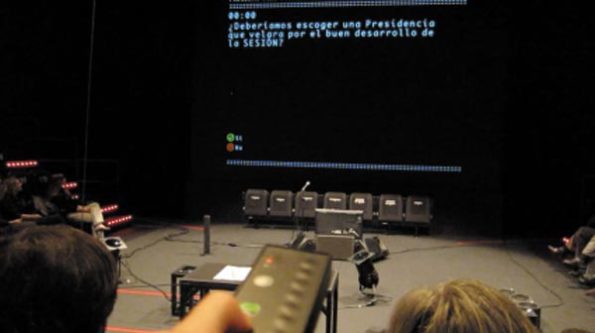Search
To search for an exact match, type the word or phrase you want in quotation marks.
A*DESK has been offering since 2002 contents about criticism and contemporary art. A*DESK has become consolidated thanks to all those who have believed in the project, all those who have followed us, debating, participating and collaborating. Many people have collaborated with A*DESK, and continue to do so. Their efforts, knowledge and belief in the project are what make it grow internationally. At A*DESK we have also generated work for over one hundred professionals in culture, from small collaborations with reviews and classes, to more prolonged and intense collaborations.
At A*DESK we believe in the need for free and universal access to culture and knowledge. We want to carry on being independent, remaining open to more ideas and opinions. If you believe in A*DESK, we need your backing to be able to continue. You can now participate in the project by supporting it. You can choose how much you want to contribute to the project.
You can decide how much you want to bring to the project.

Roger Bernat presented his work “Pendiente de votación” at the Festival of New Open Scenes (another cultural event in Barcelona hanging on a thread). A piece, in which the theatre is converted into a parliament, governed by the spectators. In number 95 of A*Magazine, Roger Bernat, interviewed by Saioa Olmo, declared that he understands theatre, “as this place where a series of people gather together to ask themselves about what it means to live in community”. In “Pendiente de votación” he puts this into practice.
One of the exhibitions at MACBA that sticks in the mind was titled A theater without theater. It discussed formalist premises about the purity of art and reclaimed hybridisation in the arts, incorporating the idea of theatricality. The museum was presented as a place, which while not a theatre was a place of theatrical practices. Roger Bernat in his latest proposal has turned the premise of theatre without theatre on its head. Here we are in a theatre, in a space with a stage and seats, with spectators, but without theatricality. Or, at least, without representation or actors. The actors are the spectators themselves, who pass the two hours of the “function” making decisions, voting and discussing the proposals of a machine. Don’t worry! It’s not one of those typical pieces of incommodious theatre where one has to get up on stage and act the fool.
Before entering the hemicycle each spectator receives a remote control with which to vote yes or no, or to abstain in response to the questions that are proposed by the machine, superimposed on a large screen in the middle of the stage. In fact you aren´t even obliged to vote. The first questions function as a sort of agreement or contract with the spectator about whether he or she is willing to enter the game. Do you feel capable of using the remote without receiving instructions? Are you capable of making decisions tonight? The yeses are overwhelming. The game is accepted, we are willing to vote and make decisions. I suppose, that if in the event Roger Bernat found himself with a unanimous no he would end the function at this point.
From the beginning the question is raised: this is not a space of representation, it is an autonomous space where people make decisions about how to organise themselves. It is a real space. The space is declared inviolable, and that it is its own independent territory. Theatre without representation, in “pending vote” Roger Bernat insists on carrying out a theatrical practice that assumes the crisis of representation, the impossibility of representing. Following Situationist theory to the letter, what he proposes is a situation. This doesn´t mean that there is no narrative. On the contrary, the voting itself establishes the situation.
We can choose between listening to the Beatles or the Stones. Damn it, in the session that I went to the Beatles won. They say that the world is divided between those who like the Beatles, and those who like the Stones. I’m in the minority. One has to accept the laws of this small and transitory democracy that we’ve decided to play with here for a few hours. This is what the piece is about, accepting the contradictions of democracy. Even more so, when, as was the case, one is faced with a public committed to free thought. And to whom Roger Bernat makes some concessions, undoubtedly destined to generate sympathy and empathy: the proposal for obligatory military service is overruled, there won’t be security, the monarchy will be abolished and the third republic will be declared. Hurrah. However, there are also a few trick questions: if there is no security, it will be left to the mercy of others, for example the security of the theatre. Equally the public’s revolutionary predisposition leads to the decision that the system can foresee revolution, which annuls any possibility of revolution. Or that by establishing a system of social reinsertion for terrorists, means admitting that in a process of peace there has to be an economic exchange. In this way current topics (15M or welfare benefits) are raised in questions, which undoubtedly are capricious but that have the virtue of indicating that from the moment one decides to play the democratic game its contradictions are accepted, and ultimately even the fall into demagogy.
In fact the story of the piece insists on it. First by pairing off the spectators according to affinities and in having them share the vote and then by establishing parties based on the same affinities, amongst whom the internal discussions, at least in the session that I took part in, were marked by indecision. An indecision that is taken to the limit, when at the end of the piece the general spokesperson for all the spectators, out of idleness, tiredness or indecisiveness, cedes all the power to the machine. This hidden machine that we all suspect is governing our apparent democracy. So that in the end, not even Roger Bernat has been able to escape representation: the representation of democracy. This real space of theatre ends up being distorted by also being a figurative space, that demands a meta-reading. That of having attended a spectacle in which one also had the illusion of being able to choose. Although it was in this case, of course, entertaining.

http://www.davidgtorres.net
"A desk is a dangerous place from which to watch the world" (John Le Carré)